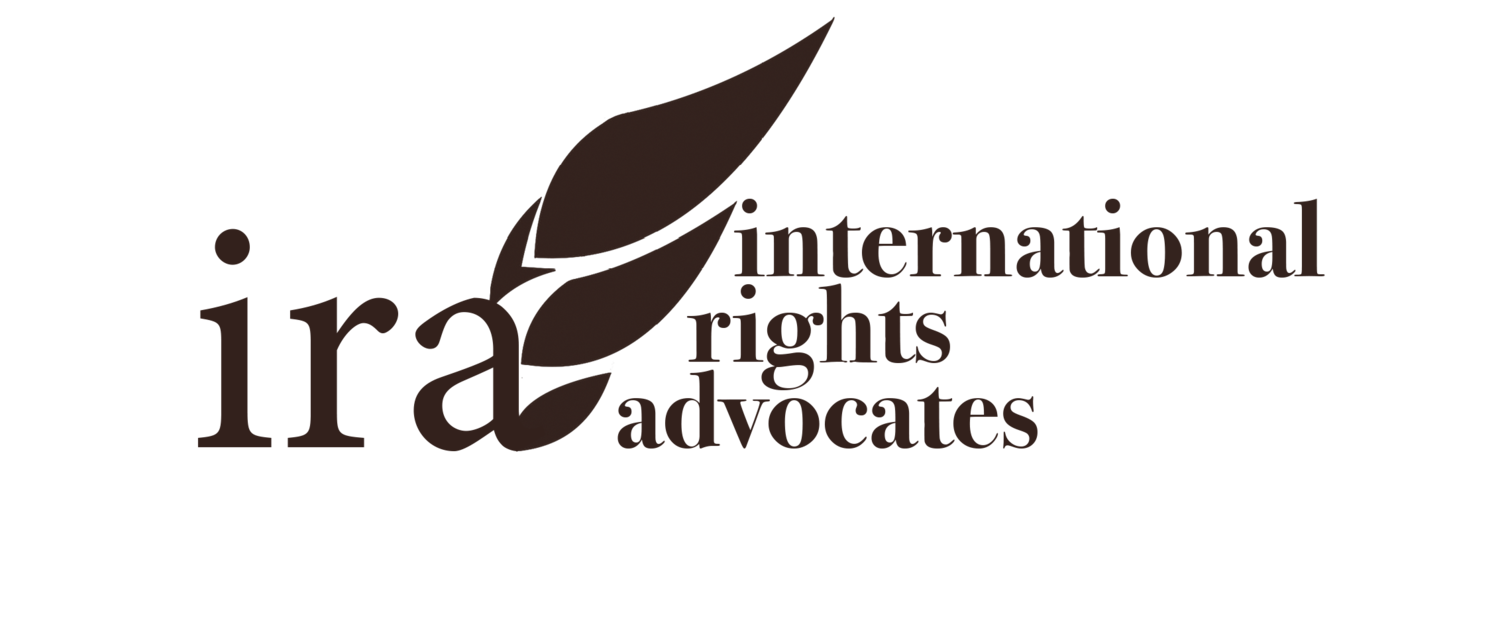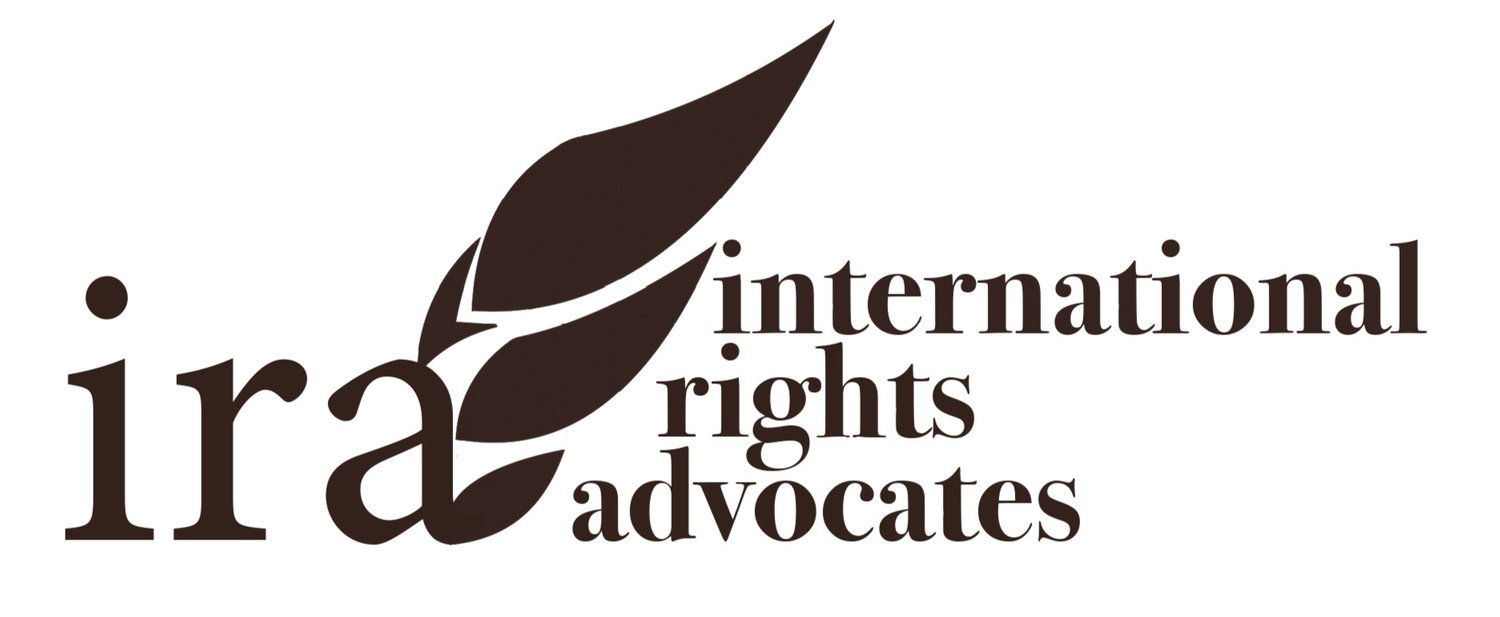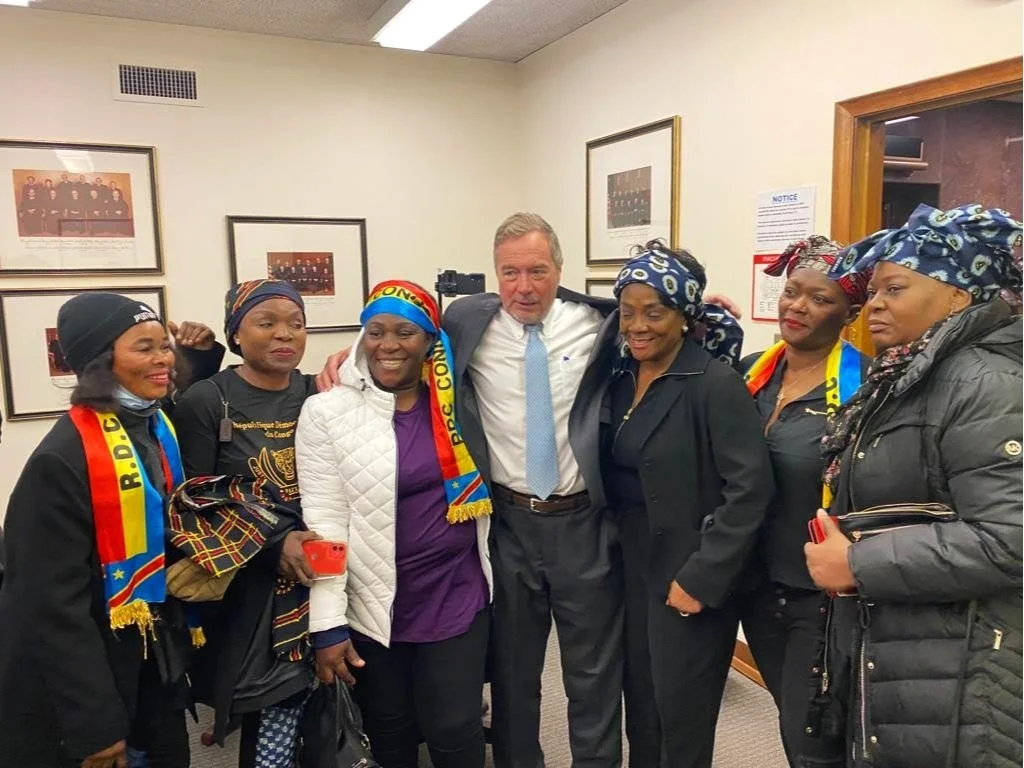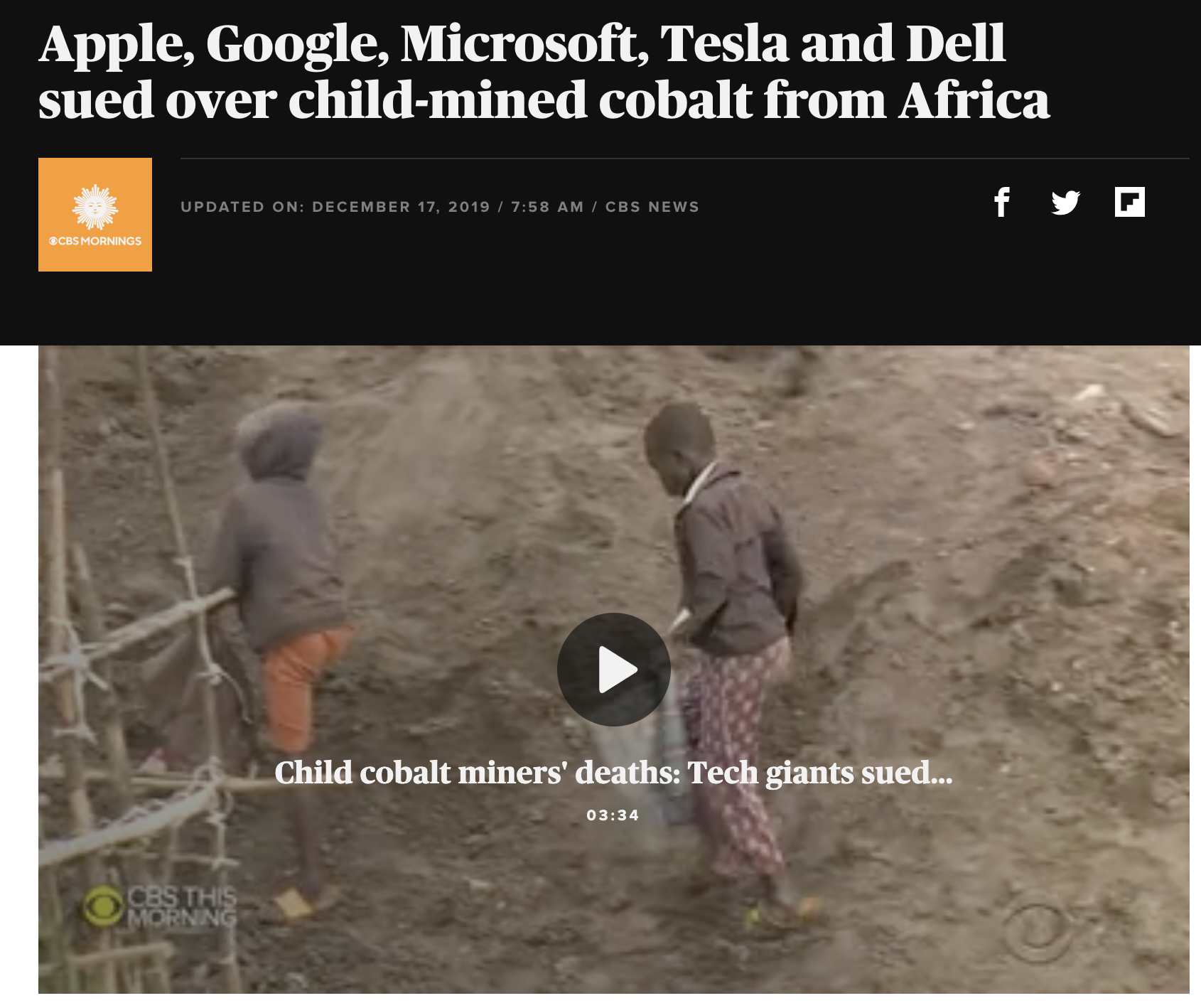Case update: A federal appeals court ruled against holding five major tech companies responsible for allegedly supporting child labor in cobalt mines in the Democratic Republic of the Congo.
On March 5, 2024, the Court of Appeals for the District of Columbia Circuit decided not to hold Apple, Tesla, Google, Microsoft, and Dell accountable for their alleged involvement with child labor in the cobalt mines of the Democratic Republic of the Congo (DRC). This ruling is a setback for our efforts to combat child labor within the tech industry's supply chains. Despite this, IRAdvocates remains committed to pursuing justice for the families affected by these practices. We are exploring all available options for appeal and planning further actions to ensure multinational corporations do not evade responsibility for human rights violations. This fight is far from over, and we continue to seek your support in holding these companies accountable.
Multinational companies are liable for human rights abuses within their supply chains.
On December 16, 2019 IRAdvocates filed a federal class action lawsuit using the Trafficking Victims Protection Reauthorization Act (“TVPRA”), 18 U.S.C. § 1595 et. seq. against major tech companies on behalf of 14 Doe Plaintiffs who are either guardians of children killed in tunnel collapses while mining cobalt in the Democratic Republic of Congo (“DRC”) or children who were maimed in such accidents. The complaint was amended in June 2020
In response to the Complaint, the companies denied any responsibility for what happens in distant cobalt mines in the DRC, but at the same time, the companies claim to have “strict policies” against child labor in all aspects of their supply chain. For example, in this October 29, 2020 article, Microsoft’s spokesperson said:
“We are committed to responsible and ethical sourcing of materials and do not tolerate child labour in our supply chain,” said a Microsoft spokesperson. “We hold our suppliers to the high standards prescribed in our supplier code of conduct, including upholding human rights, labour, health and safety, environmental and business ethics. While we continue to work with non-governmental organisations to help bring an end to child labour in the DRC and beyond, we have filed a motion to dismiss this suit. The claims are without merit and we believe that the court will agree.”
The DRC has the world’s largest deposits of cobalt, an essential element for rechargeable lithium-ion battery in products made by all tech and electric car companies. The tech boom has caused an explosion in demand for cobalt, but in one of the most extreme contrasts imaginable, cobalt is mined in the DRC under extremely dangerous stone age conditions by children paid a dollar or two a day to power the expensive gadgets made by some of the richest and most powerful companies in the world, including the five defendants in this case, Apple, Alphabet (Google), Dell, Microsoft, and Tesla.
Background
At our July 8, 2021 hearing on the companies’ motion to dismiss, Microsoft’s lawyer, on behalf of Microsoft and all of the defendants, stressed repeatedly that the company does not have a sufficient relationship to its suppliers to be responsible for what happens in the DRC cobalt mines. He stressed they are merely “buying cobalt.” These tech companies, which claim to be green, forward-looking, woke, and great places to work are merely taking a bloody page from the corporate playbook and hope that they can lie to consumers and claim the problem is solved because they have “policies” against child labor while arguing in court that they merely buy cobalt and have no ability to control what goes on in the cobalt mines. This is a bald-faced lie. They DO have contacts and contracts with their mining companies, they just fail to enforce their child labor policy because they don’t care about the issue as long as they can get away with merely saying they have a policy.
Because the companies have failed to take responsibility for their supply chains, despite claiming to have “policies” that allow them to monitor for and enforce their prohibition on child labor, we had no choice but to sue them. A victory in this case will set an important precedent that companies that knowingly support forced labor or trafficking in their distant supply chains can be held liable in a U.S. Court.
Plaintiffs have a strong case that the companies are liable under the TVPRA for using forced and trafficked child labor to mine the cobalt that is essential for their electronic products. They also have “common law” claims for unjust enrichment, negligent supervision, and infliction of emotional distress.
The TVPRA was originally enacted as a criminal statute to prohibit trafficking and forced labor, and it was primarily targeting sex-trafficking. It has since been amended several times and now has parallel civil provisions that allow victims of trafficking or forced labor to file a claim for damages and injunctive relief. As a group of Members of Congress recently asserted in an amicus brief filed in the Supreme Court in IRAdvocates’ Alien Tort Statute case against Nestle and Cargill, the TVPRA is tailor made for supply chain cases. Based on 18 U.S.C. §§ 1589 (a) and 1595, there are four clear elements to a TVPRA claim:
1. A person or company must “participate in a “venture”
The first element of § 1589(b)—“participation in a venture”—raises the most novel legal question. “Venture” is not defined in § 1589 (a). One method of interpretation is to simply look to the ordinary definition, which would suggest “venture” refers to any risk-bearing activity. Another option is to look to § 1591(c)(3), which defines “venture” in the criminal child sex-trafficking context as “any association in fact.” In this case, the defendant companies all have close relationships with the two main cobalt mining companies in DRC, Glencore, a notoriously bad global mining company based in Switzerland, and Huayou, a Chinese company that has successfully hidden behind the veil of Chinese secrecy. There are several examples of the companies working together to protect their access to DRC cobalt, including their support for and participation in the “Fair Cobalt Alliance,” a bogus company-controlled initiative to improve conditions for cobalt miners and end the use of child miners. It was formed in response to public reports of the horrors of cobalt mining and appears to be a mere public relations ploy. Most important, based on the companies’ own assertions, each of them claim to have the contractual right to enforce their policies against child labor in the mines of their suppliers. Apple, Alphabet (Google), Dell, Microsoft, and Tesla are more than mere purchasers of cobalt; they have developed contractual relationships with their cobalt suppliers to ensure a steady supply of cheap cobalt. This should be more than sufficient to establish their participation in a “venture.”
2. The companies “knowingly benefit from” their participation in the venture.
DRC cobalt is essential to the operations of the defendant tech companies. By establishing relationships with Glencore and Huayou, the companies that are mining cobalt with forced and trafficked child labor, the defendants benefit from a steady supply of cheap cobalt that they need for every one of their products.
3. The cobalt venture utilizes trafficked or forced labor as defined by § 1589(a).
Based on the terms of the statute, the venture the defendants participate in uses “force, threats of force, physical restraint, or threats of physical restraint” to require the Plaintiffs to work without compensation and perform labor that is well within the definition of ILO Convention 182 for the Worst Forms of Child Labor. There was also a “scheme, plan, or pattern intended to cause the person to believe that, if that person did not perform such labor or services, that person or another person would suffer serious harm or physical restraint.”
Plaintiffs in this case are eleven children who were severely injured in tunnel collapses and legal representatives for five children who were buried alive and died in tunnel collapses while they were forced to perform extremely dangerous cobalt mining work for the benefit of defendants and their cobalt mining venture. Each of the living Plaintiffs will testify how they were recruited by labor brokers and then ordered to perform the dangerous work in the cobalt mines. They were threatened by intimidating overseers and most of them were told if they didn’t do what they were told they would never work in any mines in the area and would starve. The surviving relatives of the five children who were killed while mining cobalt will relate similar details. The fact that the Plaintiffs were young children when they were coerced into working amplifies that they were easily intimidated. It’s hard to imagine that a child would go to work in a dangerous cobalt mine, knowing that the mines collapse all the time, unless he had no choice.
4. The Defendant companies knew or recklessly disregarded that the venture was using forced or trafficked child labor.
Plaintiffs’ complaint has numerous examples of public reports of the horrible conditions facing children in DRC cobalt mines. At a minimum, this provided the companies with constructive knowledge of child labor in the mines of their suppliers. In one example, Amnesty international contacted the companies and raised questions about how they were ensuring that children were not being killed or maimed in the mines of the companies’ suppliers. In addition, the fact that the companies claimed to have policies against child labor certainly supports the inference that they had reason to believe there was child labor in their suppliers’ mines. Plaintiffs here certainly have made sufficient allegations of the companies’ knowledge to allow a jury to find that they knew or should have known of the forced child labor in the cobalt mines.
Case Details
Docket No. CV: 1:19-cv-03737 (CJN) Op. Below Federal District Court for the District of Columbia Argument N/A Opinion N/A Vote: N/A Judge: Judge Carl J. Nichols Term: N/A
Holding
Pending
Judgment
Pending
UPDATE:
The five defendant companies, Apple, Alphabet (Google), Dell, Microsoft, and Tesla, filed a Motion to Dismiss . Plaintiffs responded with an Opposition to the Motion. The defendants filed a Reply Brief and closed the pleadings on December 16, 2020. The Court held a hearing for several hours on July 8, 2021. The Court issued a decision on November 2, 2021 dismissing the case. The ruling ignored dozens of other federal decisions and was the first decision to hold that the TVPRA does not extend extraterritorially in civil cases. The court also applied an extremely narrow definition of “venture” under the statute and found that the five defendants were not in a “commercial enterprise” with the mining companies. The decision represents an extreme narrowing of the TVPRA, and if upheld on appeal, will severely limit this essential tool for fighting trafficking and forced labor in the DC Circuit. We have filed a notice of appeal and the Court of Appeals will soon set a briefing schedule Look for updates on this site. On August 8th, 2022 we filed the Appellants’ Opening Brief.
Documents
What People Are Saying
When the case was filed, the Guardian labeled it a “landmark case” and noted “it is the first time that any of the tech companies have faced such a legal challenge.”
— The Guardian
One of two videos of news reports aired after the case was filed. Both have video of the cobalt mines and express alarm that the giant tech companies, Apple, Alphabet (Google), Dell, Microsoft, and Tesla, are allowing child miners to get killed or maimed to supply cobalt to the companies.
— CBS News
How you can help.
Contribute to our work by donating.
Advocate by reaching out to the companies being sued.
Sharing on social media using our toolkit










